介词讲解
- 格式:doc
- 大小:50.81 KB
- 文档页数:11
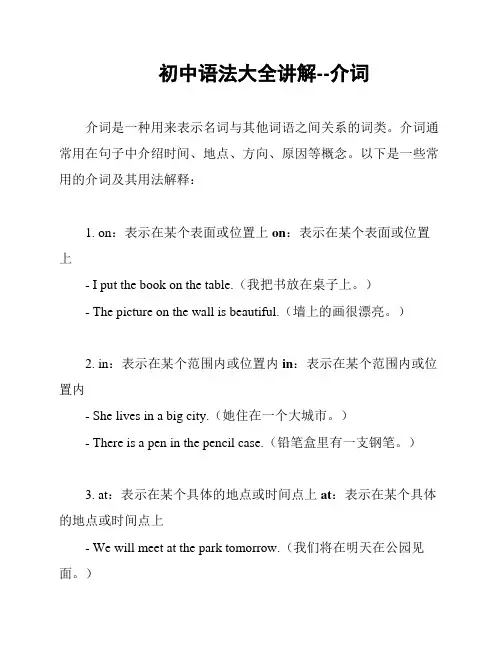
初中语法大全讲解--介词介词是一种用来表示名词与其他词语之间关系的词类。
介词通常用在句子中介绍时间、地点、方向、原因等概念。
以下是一些常用的介词及其用法解释:1. on:表示在某个表面或位置上on:表示在某个表面或位置上- I put the book on the table.(我把书放在桌子上。
)- The picture on the wall is beautiful.(墙上的画很漂亮。
)2. in:表示在某个范围内或位置内in:表示在某个范围内或位置内- She lives in a big city.(她住在一个大城市。
)- There is a pen in the pencil case.(铅笔盒里有一支钢笔。
)3. at:表示在某个具体的地点或时间点上at:表示在某个具体的地点或时间点上- We will meet at the park tomorrow.(我们将在明天在公园见面。
)- He is waiting for you at the front door.(他在门口等你。
)4. to:表示朝向某个目标或对象to:表示朝向某个目标或对象- She walked to school.(她走向学校。
)- Can you pass the book to me?(你能把书递给我吗?)5. with:表示伴随或使用某个工具或对象with:表示伴随或使用某个工具或对象- I went to the park with my friends.(我和我的朋友一起去了公园。
)- He wrote the letter with a pen.(他用钢笔写了这封信。
)6. by:表示通过某种方式或交通工具by:表示通过某种方式或交通工具- We usually go to school by bus.(我们通常坐公交车去学校。
)- She sent the gift by mail.(她通过邮寄发送了礼物。
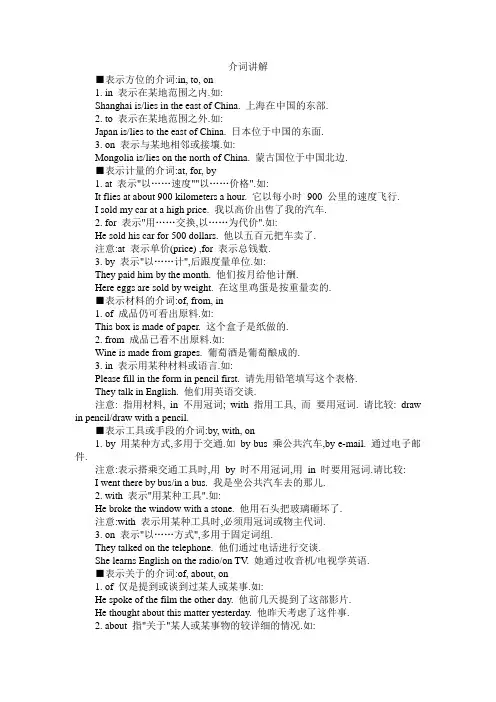
介词讲解■表示方位的介词:in, to, on1. in 表示在某地范围之内.如:Shanghai is/lies in the east of China. 上海在中国的东部.2. to 表示在某地范围之外.如:Japan is/lies to the east of China. 日本位于中国的东面.3. on 表示与某地相邻或接壤.如:Mongolia is/lies on the north of China. 蒙古国位于中国北边.■表示计量的介词:at, for, by1. at 表示"以……速度""以……价格".如:It flies at about 900 kilometers a hour. 它以每小时900 公里的速度飞行.I sold my car at a high price. 我以高价出售了我的汽车.2. for 表示"用……交换,以……为代价".如:He sold his car for 500 dollars. 他以五百元把车卖了.注意:at 表示单价(price) ,for 表示总钱数.3. by 表示"以……计",后跟度量单位.如:They paid him by the month. 他们按月给他计酬.Here eggs are sold by weight. 在这里鸡蛋是按重量卖的.■表示材料的介词:of, from, in1. of 成品仍可看出原料.如:This box is made of paper. 这个盒子是纸做的.2. from 成品已看不出原料.如:Wine is made from grapes. 葡萄酒是葡萄酿成的.3. in 表示用某种材料或语言.如:Please fill in the form in pencil first. 请先用铅笔填写这个表格.They talk in English. 他们用英语交谈.注意: 指用材料, in 不用冠词; with 指用工具, 而要用冠词. 请比较: draw in pencil/draw with a pencil.■表示工具或手段的介词:by, with, on1. by 用某种方式,多用于交通.如by bus 乘公共汽车,by e-mail. 通过电子邮件.注意:表示搭乘交通工具时,用by 时不用冠词,用in 时要用冠词.请比较:I went there by bus/in a bus. 我是坐公共汽车去的那儿.2. with 表示"用某种工具".如:He broke the window with a stone. 他用石头把玻璃砸坏了.注意:with 表示用某种工具时,必须用冠词或物主代词.3. on 表示"以……方式",多用于固定词组.They talked on the telephone. 他们通过电话进行交谈.She learns English on the radio/on TV. 她通过收音机/电视学英语.■表示关于的介词:of, about, on1. of 仅是提到或谈到过某人或某事.如:He spoke of the film the other day. 他前几天提到了这部影片.He thought about this matter yesterday. 他昨天考虑了这件事.2. about 指"关于"某人或某事物的较详细的情况.如:Can you tell me something about yourself? 你能告诉我一些关于你自己的事情吗?3. on 指"关于"学术性的或严肃的事.如:It's a textbook on the history of china. 它是一本有关中国历史的教科书.■表原因或理由的介词:for, at, from, of, with, by, because of1. for 表示原因,常:I am sorry for what I said to you. 我后悔不该对你讲那些话.2. at 指情感变化的原因,意为"因听到或看到而……".如:He was surprised at the news. 听到这消息他大吃一惊.3. from 指"外在的原因",如受伤,车祸等.如:He died from the wound. 他因受伤而致死.4. of 指"内在的原因",如病,饿等.如:The old man died of hunger. 老人死于饥饿.5. with 指生理上或情感上的由外界到内心的原因.如:Hearing the news, he jumped with joy. 他们听到这个消息,欣喜若狂.He was shaking with anger. 他气得浑身发抖.6. by 表示外部的,尤其是暴力的或无意中造成某种结果的原因.Her body was bent by age. 他因年老背弯了.She took your umbrella by mistake. 我因弄错拿了你的雨伞.7. because of 表示引起结果的直接原因.如:He retired last month because of illness/because he ill.8. owing to 多表示引起某不良后果的原因.如:Owing to the rain they could not come. 由于下雨他们没来.9. thanks to 表示引起某种幸运结果的原因,常译为"幸亏……,多亏……".如:Thanks to John, we won the game. 多亏约翰,我们才赢了这场比赛.10. out of 表示动机的起因,常译为"出于……".如:He asked the question out of curiosity. 他出于好奇才问了那个问题.11. through 多表示因局部而影响全局的原因.如:The war was lost through bad organization. 战争因组织不周而失败了.■表示好像或当作的介词:like, as1. like 表示"像……一样",其实不是.如:Peter the Great, like his country, was strong and proud. 彼得大帝像他的国家一样强健和自豪.2. as 表示"作为,以……身份",其实也是.如:He talked to me as a father. 他以父亲的身份跟我谈话.注:as 作连词时,可表示"好像……".如:The work is not so difficult as you imagin 这工作不像你想像的那么困难.■表示支持或反对的介词:against, foragainst 反对,for 支持,互为反义词.如:Are you for my idea or against it? 你赞同还是反对我的想法?■表示除某人某物外的介词:besides, except1. besides 是包括后面所提人或物在内的"除……外,还".如:Thirty students went to the cinema besides him. 除他以外,还有30 个学生去看了电影.(他和另外30 人都去了)。
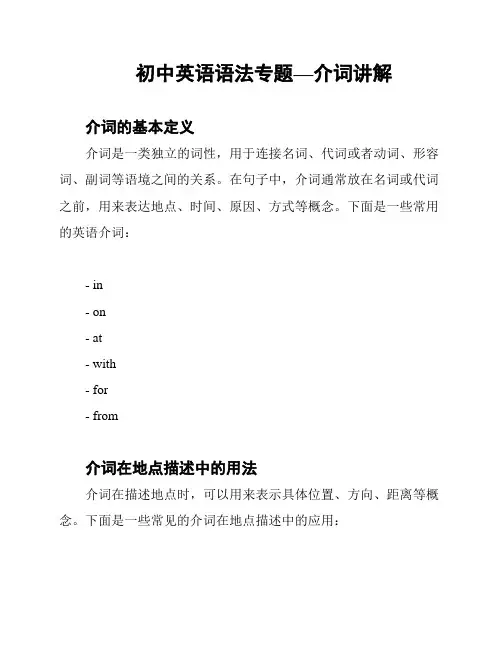
初中英语语法专题—介词讲解介词的基本定义介词是一类独立的词性,用于连接名词、代词或者动词、形容词、副词等语境之间的关系。
在句子中,介词通常放在名词或代词之前,用来表达地点、时间、原因、方式等概念。
下面是一些常用的英语介词:- in- on- at- with- for- from介词在地点描述中的用法介词在描述地点时,可以用来表示具体位置、方向、距离等概念。
下面是一些常见的介词在地点描述中的应用:- in:用于表示在某个范围之内的位置,例如 "in the room"(在房间里),"in the park"(在公园里)。
- on:用于表示在表面、平台或者位置上的状态,例如 "on the table"(在桌子上),"on the bus"(在公交车上)。
- at:用于表示在某个具体位置或者地点,例如 "at the cinema"(在电影院),"at school"(在学校)。
- to:用于表示朝向某个位置的移动,例如 "go to the park"(去公园)。
介词在时间描述中的用法介词在描述时间时,可以用来表示具体时间、时间段等概念。
下面是一些常见的介词在时间描述中的应用:- at:用于表示具体的时间点,例如 "at 7 o'clock"(在7点钟)。
- on:用于表示具体的日期或者星期几,例如 "on Monday"(星期一),"on January 1st"(1月1日)。
- in:用于表示较长的时间段或者某一个时间段内,例如 "inthe morning"(早上),"in July"(在七月)。
介词在原因描述中的用法介词在描述原因时,可以用来表示某事的起因或者原因。
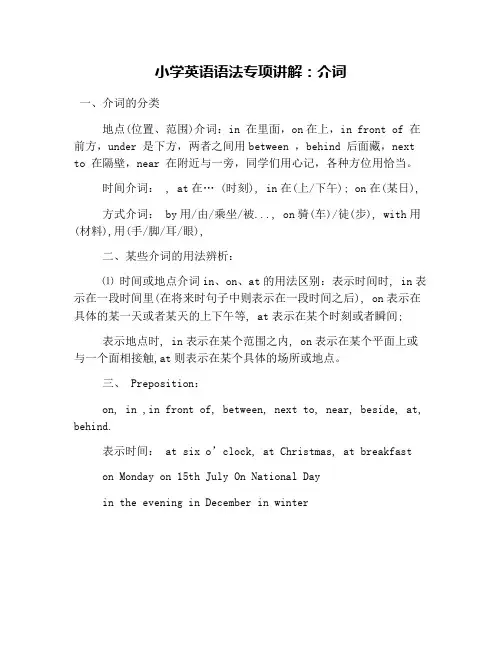
小学英语语法专项讲解:介词
一、介词的分类
地点(位置、范围)介词:in 在里面,on在上,in front of 在前方,under 是下方,两者之间用between ,behind 后面藏,next to 在隔壁,near 在附近与一旁,同学们用心记,各种方位用恰当。
时间介词: , at在… (时刻), in在(上/下午); on在(某日),
方式介词: by用/由/乘坐/被..., on骑(车)/徒(步), with用(材料),用(手/脚/耳/眼),
二、某些介词的用法辨析:
⑴ 时间或地点介词in、on、at的用法区别:表示时间时, in表示在一段时间里(在将来时句子中则表示在一段时间之后), on表示在具体的某一天或者某天的上下午等, at表示在某个时刻或者瞬间;
表示地点时, in表示在某个范围之内, on表示在某个平面上或与一个面相接触,at则表示在某个具体的场所或地点。
三、 Preposition:
on, in ,in front of, between, next to, near, beside, at, behind.
表示时间:at six o’clock, at Christmas, at breakfast
on Monday on 15th July On National Day
in the evening in December in winter。
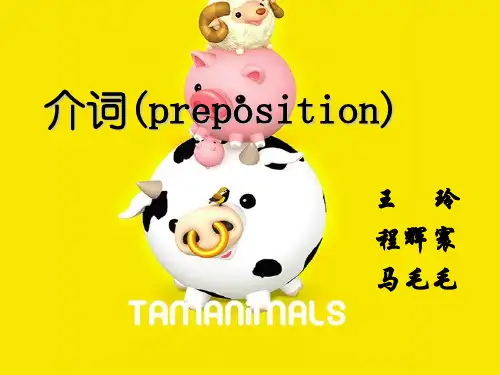
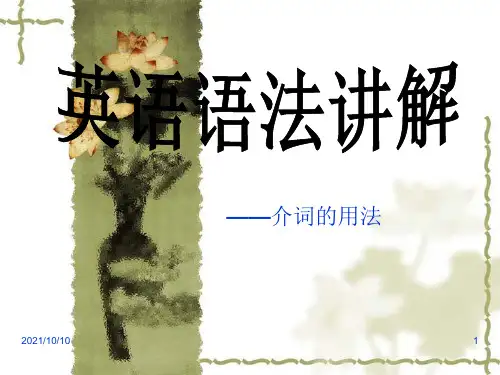
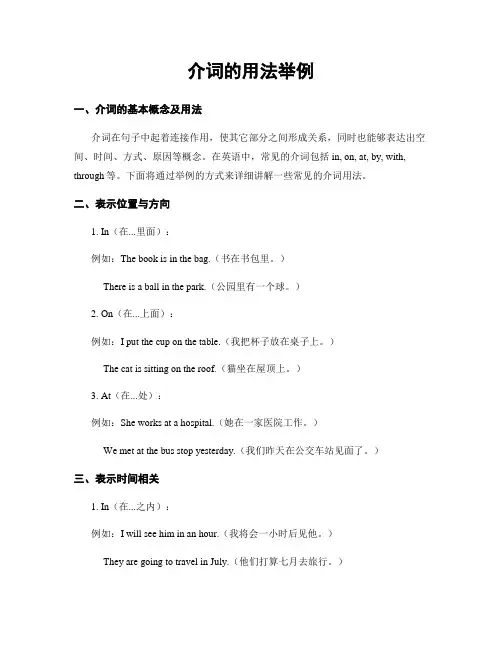
介词的用法举例一、介词的基本概念及用法介词在句子中起着连接作用,使其它部分之间形成关系,同时也能够表达出空间、时间、方式、原因等概念。
在英语中,常见的介词包括in, on, at, by, with, through等。
下面将通过举例的方式来详细讲解一些常见的介词用法。
二、表示位置与方向1. In(在...里面):例如:The book is in the bag.(书在书包里。
)There is a ball in the park.(公园里有一个球。
)2. On(在...上面):例如:I put the cup on the table.(我把杯子放在桌子上。
)The cat is sitting on the roof.(猫坐在屋顶上。
)3. At(在...处):例如:She works at a hospital.(她在一家医院工作。
)We met at the bus stop yesterday.(我们昨天在公交车站见面了。
)三、表示时间相关1. In(在...之内):例如:I will see him in an hour.(我将会一小时后见他。
)They are going to travel in July.(他们打算七月去旅行。
)2. On(在某日或某时刻):例如:We have a meeting on Monday morning. (我们星期一上午有个会议。
) The train will arrive on time.(火车将准时到达。
)3. At(在某个具体的时刻):例如:They usually have lunch at noon.(他们通常中午吃饭。
)We will meet at 7 p.m.(我们将在晚上七点见面。
)四、表示方式与原因1. By(通过...方式):例如:He goes to work by car every day.(他每天乘车去上班。
)I communicate with my friends by email.(我通过电子邮件和朋友们沟通。

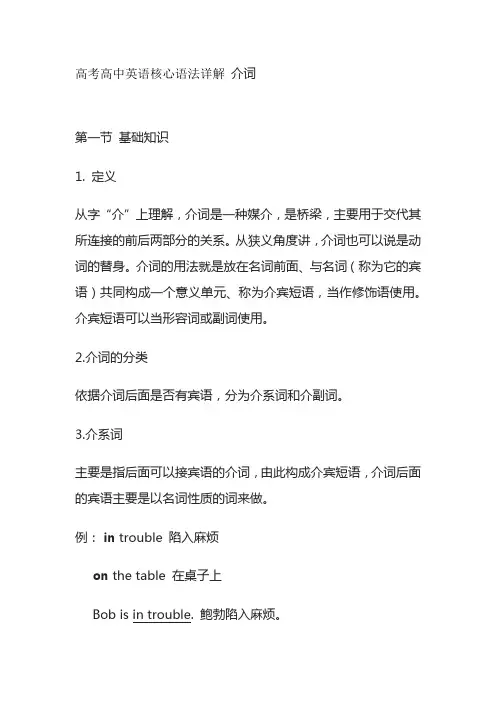
高考高中英语核心语法详解介词第一节基础知识1. 定义从字“介”上理解,介词是一种媒介,是桥梁,主要用于交代其所连接的前后两部分的关系。
从狭义角度讲,介词也可以说是动词的替身。
介词的用法就是放在名词前面、与名词(称为它的宾语)共同构成一个意义单元、称为介宾短语,当作修饰语使用。
介宾短语可以当形容词或副词使用。
2.介词的分类依据介词后面是否有宾语,分为介系词和介副词。
3.介系词主要是指后面可以接宾语的介词,由此构成介宾短语,介词后面的宾语主要是以名词性质的词来做。
例:in trouble 陷入麻烦on the table 在桌子上Bob is in trouble. 鲍勃陷入麻烦。
A red apple is on the table. 一个红苹果放在桌子上了。
4.介副词后面没有宾语,而是直接当副词使用。
Come in. 进来!The soldier stood up. 那名士兵站起来了。
5. 介副词和介词共同使用Mary went down to the basement. 玛丽去了地下室。
down 是介副词,后面没有宾语、直接修饰动词went;to 是介系词,后接名词词组the basement 当宾语、构成一个介词词组to the basement;went 看作不及物动词,后接介词to,再加宾语the basement;He has gone over to your office.over 是介副词,直接修饰动词has gone;to 是介词,后接名词词组your office 当宾语,构成一个介词词组to your office;gone看作不及物动词,后接介词to,再加宾语your office;第二节介系词在短语层面的应用介系词加宾语构成介宾短语后,主要出现在后修饰位置,其作用是交代中心词与其后的宾语之间的关系。
此时介宾短语也可视为形容词的性质。
例:a.2000 entry into the World Trade Organization2000年加入世贸b.an important earner of foreign exchange 赚取外汇的重要来源c. a boom in exports 出口增长第三节介系词在句子层面的应用1. 前状/后状:With the warm weather, the trees grow very well. 天气暖和,树木生长的很好!Kill two birds with one stone. 一石二鸟/一举两得。
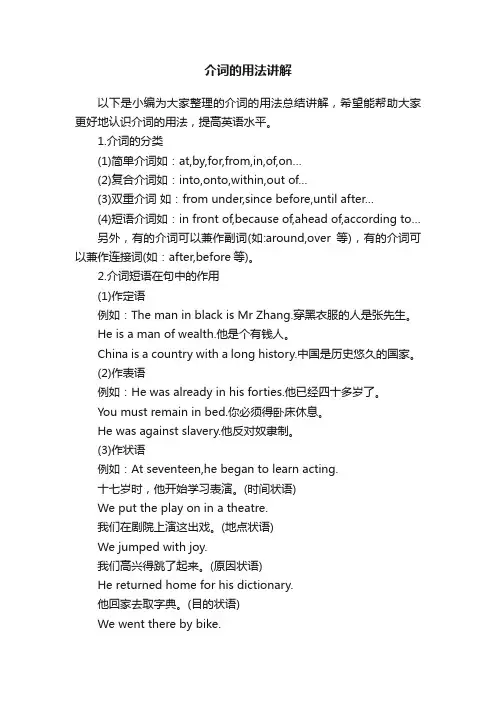
介词的用法讲解以下是小编为大家整理的介词的用法总结讲解,希望能帮助大家更好地认识介词的用法,提高英语水平。
1.介词的分类(1)简单介词如:at,by,for,from,in,of,on…(2)复合介词如:into,onto,within,out of…(3)双重介词如:from under,since before,until after…(4)短语介词如:in front of,because of,ahead of,according to…另外,有的介词可以兼作副词(如:around,over等),有的介词可以兼作连接词(如:after,before等)。
2.介词短语在句中的作用(1)作定语例如:The man in black is Mr Zhang.穿黑衣服的人是张先生。
He is a man of wealth.他是个有钱人。
China is a country with a long history.中国是历史悠久的国家。
(2)作表语例如:He was already in his forties.他已经四十多岁了。
You must remain in bed.你必须得卧床休息。
He was against slavery.他反对奴隶制。
(3)作状语例如:At seventeen,he began to learn acting.十七岁时,他开始学习表演。
(时间状语)We put the play on in a theatre.我们在剧院上演这出戏。
(地点状语)We jumped with joy.我们高兴得跳了起来。
(原因状语)He returned home for his dictionary.他回家去取字典。
(目的状语)We went there by bike.我们骑自行车去那儿的。
(方式状语)In spite of the heavy rain,they arrived.尽管雨下得大,他们还是到了。
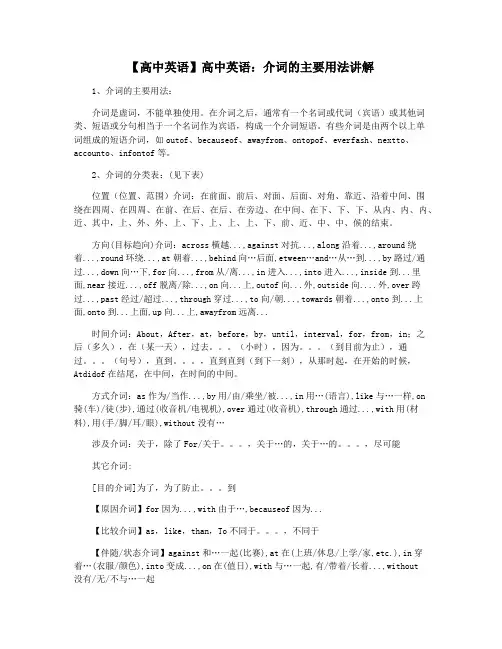
【高中英语】高中英语:介词的主要用法讲解1、介词的主要用法:介词是虚词,不能单独使用。
在介词之后,通常有一个名词或代词(宾语)或其他词类、短语或分句相当于一个名词作为宾语,构成一个介词短语。
有些介词是由两个以上单词组成的短语介词,如outof、becauseof、awayfrom、ontopof、everfash、nextto、accounto、infontof等。
2、介词的分类表:(见下表)位置(位置、范围)介词:在前面、前后、对面、后面、对角、靠近、沿着中间、围绕在四周、在四周、在前、在后、在后、在旁边、在中间、在下、下、下、从内、内、内、近、其中,上、外、外、上、下、上、上、上、下、前、近、中、中、候的结束。
方向(目标趋向)介词:across横越...,against对抗...,along沿着...,around绕着...,round环绕...,at朝着...,behind向…后面,etween…and…从…到...,by路过/通过...,down向…下,for向...,from从/离...,in进入...,into进入...,inside到...里面,near接近...,off脱离/除...,on向...上,outof向...外,outside向....外,over跨过...,past经过/超过...,through穿过...,to向/朝...,towards朝着...,onto到...上面,onto到...上面,up向...上,awayfrom远离...时间介词:About,After,at,before,by,until,interval,for,from,in;之后(多久),在(某一天),过去。
(小时),因为。
(到目前为止),通过。
(句号),直到。
,直到直到(到下一刻),从那时起,在开始的时候,Atdidof在结尾,在中间,在时间的中间。
方式介词:as作为/当作...,by用/由/乘坐/被...,in用…(语言),like与…一样,on骑(车)/徒(步),通过(收音机/电视机),over通过(收音机),through通过...,with用(材料),用(手/脚/耳/眼),without没有…涉及介词:关于,除了For/关于。
英语介词讲解介词(preposition)是一种用来连接名词、代词或名词短语与其他词或短语的词类,在句子中常常表示位置、方向、时间、关系等。
以下是一些常见的英语介词及其用法:1.in:表示在某个位置、地点、范围或状态之内。
例如:in the room(在房间里)、in London(在伦敦)、in the book(在书中)等。
2.on:表示在某个平面、表面、方向或日期上。
例如:on the table(在桌子上)、on the wall(在墙上)、on Monday(在星期一)等。
3.at:表示在某个点、时间、活动或事件上。
例如:at the park(在公园)、at 8 o'clock(在8点)、at the party(在聚会上)等。
4.by:表示通过某种方式、手段或时间。
例如:by car(乘车)、by email (通过电子邮件)、by Friday(到星期五)等。
5.for:表示为某个目的、目标或时间段。
例如:for you(为你)、for two hours(两个小时)、for breakfast(作为早餐)等。
6.to:表示朝向某个地点、目的地或对象。
例如:to the park(到公园)、to the store(到商店)、to you(给你)等。
7.from:表示起点、来源或运动方向。
例如:from the house(从房子里)、from London(从伦敦)、from Monday to Friday(从星期一到星期五)等。
8.with:表示伴随、附带或使用某物。
例如:with my friend(和我的朋友一起)、with a pen(用一支笔)、with pleasure(乐意)等。
9.about:表示关于某个主题、话题或方面。
例如:about the book(关于这本书)、about the weather(关于天气)、talk about(谈论)等。
10.of:表示属于、关于或由某物组成。
介词一、介词概述1、介词的定义:介词是一种虚词,用来表示名词或相当于名词的其它词语在句中与其它词的关系,不能单独使用。
介词可与名词或相当于名词的其它词构成介词短语。
介词短语可在句中作定语,状语,表语和宾语补足语。
2、介词的分类:时间介词、地点介词、方式介词、原因介词等。
3. 介词短语的句法作用介词短语作为一个成分在句中可用作定语、状语、表语、宾语补足语等。
(1)作定语介词短语作定语时,一般放在被修饰词的后面,作后置定语。
The book on the desk is very interesting.书桌上的那本书很有趣。
China is a great country with a long history.中国是一个具有悠久历史的国家。
(2)作状语介词短语作状语时,一般放在动词后面或句末、句首。
用来表示时间、地点、目的、方式和原因等。
The basketball match will start at nine.篮球比赛将在9点开始。
(表示时间)He likes to swim in the river.他喜欢去河里游泳。
(表示地点)I went there to get my book back.我去那里取回我的书。
(表示目的)I came here by bike.我骑自行车来到这里。
(表示方式)She was trembling with fear.她吓得直发抖。
(表示原因)(3)作表语介词短语作表语时,一般放在be动词和连系动词之后。
I’m on duty today.今天我值日。
My English teacher is from Australia.我的英语老师来自澳大利亚。
(4)作宾语补足语介词短语作宾语补足语时,一般放在宾语之后。
I found everything in good condition.我发现一切状况良好。
When he woke up, he found himself in the hospital.当他醒来时,他发现自己在医院里。
介词的用法与搭配细致讲解常见介词的用法及其与动词名词形容词的搭配介词的用法与搭配介词在英语中起着连接词语之间关系的作用,它可以用来表示时间、空间、目的、原因、方式等等。
正确地使用介词不仅可以使语句通顺,还能使表达更加准确和自然。
本文将细致讲解常见介词的用法及其与动词、名词、形容词的搭配。
一、表示时间的介词:1. At:表示具体的某个时间点,例如:at 3 o'clock,at noon,at midnight等。
2. In:表示较长的时间段,例如:in September,in the morning,in the past等。
3. On:表示具体的某一天,例如:on Monday,on Christmas Day等。
4. By:表示“在...之前”,例如:by 5 o'clock,by the end of the week 等。
二、表示空间的介词:1. In:表示在某个范围、区域或地点之内,例如:in the room,in London等。
2. On:表示在某个物体的表面,例如:on the table,on the wall等。
3. At:表示在某个具体的位置,例如:at the corner,at the bus stop 等。
4. By:表示经过某个地点,例如:by the river,by the beach等。
三、表示目的的介词:1. For:表示目的、用途,例如:This book is for you.(这本书是给你的。
)2. To:表示方向、目标,例如:I am going to the park.(我要去公园。
)3. With:表示陪伴、带有,例如:I will go shopping with my friends.(我会和朋友一起去购物。
)四、表示原因的介词:1. Because of:表示因为,例如:I couldn't come because of the heavy rain.(因为下大雨,我没法来。
介词是一种用来表示词与词、词与句之间的关系的虚词,在句中不能单独作句子成分。
介词后面一般有名词代词或相当于名词的其他词类,短语或从句作它的宾语。
介词和它的宾语构成介词词组,在句中作状语,表语,补语或介词宾语。
介词可以分为时间介词、地点介词、方式介词、原因介词和其他介词,一、概念:介词(prepositions,简称prep),又称前置词,是英语中最活跃的词类之一,连接主语和表语。
特别是一些常用介词的搭配力特别强,可以用来表示各种不同的意思。
英语里大部分习语都是由介词和其他词构成的。
介词在句中一般不重读。
的结构中,不能用that 代替who/which。
She is a good student from who we should learn.二.相关知识点精讲1)at ,in, on, to,forat (1)表示在小地方;(2)表示“在……附近,旁边”in (1)表示在大地方;(2)表示“在…范围之内”。
on 表示毗邻,接壤,“在……上面”。
to 表示在……范围外,不强调是否接壤;或“到……”2)above, over, on 在……上above指在……上方,不强调是否垂直,与below相对;over指垂直的上方,与under相对,但over与物体有一定空间,不直接接触。
On表示某物体上面并与之接触。
The bird is flying above my head.There is a bridge over the river.He put his watch on the desk.3)below, under 在……下面under表示在…正下方below表示在……下,不一定在正下方There is a cat under the table.Please write your name below the line.4)in front of, in the front of在……前面in front of…意思是“在……前面”,指甲物在乙物之前,两者互不包括;其反义词是behind(在……的后面)。
介词专题复习---(一)介词的含义:,是英语中最活跃的词类之一,主要用来表示时间、地点、目虚词介词是一种。
的、原因、程度和方式等。
在句子中不能单独作任何成分(二)介词的分类简单介词。
例如:1.in, from, about, at, over, on, under, past复合介词。
例如:2.without, onto, outside, within, into; inside短语介词。
例如:3.because of, in front of, instead of(三)常见介词的用法表示时间的介词的用法:1.at, in, on。
常用介词)表示“在何时”1 at 一般用来表示在某一具体的时间点。
例如:(1)在七点钟at seven在……岁时at the age of在……的开始at the beginning ofin 表示年、季节、月、周、上午、下午、晚上等。
(2)2012年在in 2012在夏天in summer月在10 in October在一周之内,在两周之内in a week/ in two weeks晚上/ 下午/ in the morning/afternoon/evening 在早上)用来表示具体的某一天,如果专指某一天的上午、下午、晚上,要用3(例如:on在星期日on Sunday在星期日的早上on Sunday morning日的早上月1on the morning of June 1st 在6 on a cold winter night 在一个寒冷的冬夜1状元典例th April, 2010 was a )1.The earthquake which happened in Yushu ______14(big disaster.D. toB. onC. in A. at)2.The car accident happened ______ a cold winter morning. Luckily, no (one was hurt.D. ofC. at A. in B. onThe famous writer William Shakespeare was born ______1564. )3.(D. of C. at B. on A. induring, from…to…,常用介词。
“2)表示在……期间””在……期间。
例如:during “1()在暑假期间during the summer holiday1during the night 在夜间(2)from …to…表示“从……到……”例如:from Monday to Friday 从周一到周五from 7 o'clock to 9 o'clock 从7点到9点3)其他表示时间的介词,例如:before, after, since, for, until, by, past, to。
(1)before & after词义用法before +时在……之beforeafter时在……之afterShe often reads newspapers after breakfast. 她经常早饭之后看报纸。
I'll be free before 7 o'clock tomorrow. 我明天7点前会有空。
I have learned English since 2002.我自2002年以来就学习英语了。
We have known each other since I was a little boy.They have lived here for ten years.(3)until (till)“直到……”,常用not…until…“直到……才……”,until后接点时间。
He will wait for me until 11 o'clock.They didn't stop until midnight.(4)by “到……前;截止到……”,常用于完成时。
He has finished his homework by 5 o'clock yesterday afternoon.We had learned eight hundred words by the end of last week.状元典例It's said he stayed there quietly _____ two o'clock that afternoon.A. onB. atC. untilD. by(5)past & to表示超过某一时刻past表示几点差几分to例如:ten past two 2:10ten to two 1:50注意:在this, that, last, next, every等词前不加介词。
例如:2last night 昨天晚上this morning 今天早上2. 表示地点,方位的介词的用法1)in & at “在……”in +大地点inat+小地点at例如:in Shanghai 在上海in the south 在南方at the gate 在大门口at the end of the road 在路的尽头There is a bag on the desk. 床上有一个书包。
The lamp is over the table. 灯在桌子的正上方。
The heaven is above us.苍天在上。
There is a ball under the bed.床下有一个球。
The temperature will stay above zero in the day-time, but at night it will fall below zero again.白天的气温在零度以上,但是到了晚上气温会降到零度以下。
4) before, in front of & in the front of “在……前”3A is in front of B.in the 指一个物体包含在另一个物front 在……前部体的内部的前方。
ofA is in the front of B.She stood before her teacher, not knowing what to say.There is a big tree in front of the classroom.There is a desk in the front of the classroom.教室的前部有一张桌子。
(桌子包含在教室里)状元典例Why are you standing there, Maggie?—ee the blackboard clearly. Two tall boys are sitting ______ me. —I can't sD. next to C. beside A. behind B. in front of我坐在爸爸和妈妈之间。
I sit between my father and mother.我在人群中找不到他。
I couldn't find him among the crowd.在房子的中间有一张大沙发。
There is a big sofa in the middle of the house.7) near, by, beside & around“在……附近”(有一定的距离)near”(相对距离较近)“在……旁by”“在……旁边beside“在……周围”aroundThe children are playing near the river.孩子们正在河边玩耍。
(暗指孩子们与河有一定的距离)4He is fishing by the river.他正在河边钓鱼。
(强调他与河距离很近)He sat in the chair beside the door.他坐在门边的一张椅子上。
The children gathered around the teacher.孩子们围在老师的身边。
8) outside & inside“在……外面”outside“在……里面”insideHe is waiting for me outside the room.There is something inside the box.3. 表示方位的介词的用法1) in, on & toBeijing lies in the north of China.北京位于中国的北部。
(北京包含在中国之内)Russia is on the north of China.俄罗斯在中国的北面。
(俄罗斯不包含在中国之内,但与中国接壤)Japan is to the east of China.日本在中国的东面。
(日本不包含在中国之内)状元典例11.People ______ the southwest of China were in great need of water a couple of months ago.A. inB. atC. toD. on2.The school gate is ______ the north of the classroom building.A. inB. toC. onD. at2) across, over ,through & past “穿过”5If you see the green light, you can walk across the street.如果你看见绿灯亮了,你可以穿过街道。
火车穿过隧道。
The train ran through the tunnel.我能跳过那座围墙。
I can jump over the fence.我们从医院旁边经过。
We walked past the hospital.状元典例It's dangerous to run _______the busy road.D. past C. through A.across B. along3) out of & into,有动感。
从里到外,从……出来”表示“out of,有动感。
从外到里,进入……”表示“intoThe students walked out of the classroom when the class was over.She poured some water into the glass.他喜欢用英语写信。
He likes writing letters in English.他喜欢用钢笔写东西。